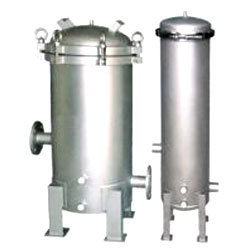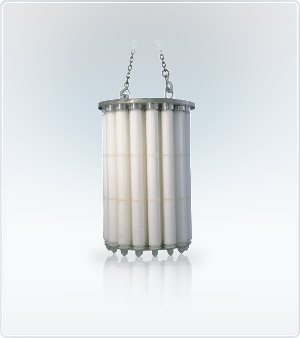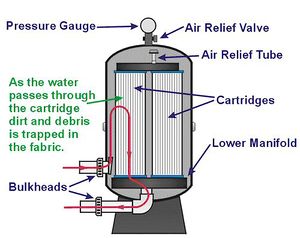Difference between revisions of "Cartridge Filters"
(Created page with "Category:Filtration{{Knoppen}} <noinclude><!------------------------------------------------ * READ THIS FIRST * Only edit this page if you can improve the content. * Improp...") |
|||
| (One intermediate revision by one other user not shown) | |||
| Line 1: | Line 1: | ||
[[Category:Filtration]]{{Knoppen}} | [[Category:Filtration]]{{Knoppen}} | ||
[[File:Cartridge_Filters_03.jpg|thumb|right|Cartridge Filters]] | |||
[[File:Cartridge_Filters_02.jpg|thumb|right|Cartridge filter]] | |||
[[File:Cartridge_Filters_01.jpg|thumb|right|Cartridge filter diagram]] | |||
* | A '''Cartridge Filter''' is a pool filter that uses a porous element (usually synthetic fabric) wrapped around a cylindrical core as a filter medium. This cylinder forms the cartridge, which can be more easily removed or replaced than loose filter media, such as sand. | ||
* | |||
* | |||
==Types of Cartridge Filters== | |||
There are two main categories of cartridge filters: | |||
* Surface cartridge filters, also called "fabric cartridges," are the most common for use in residential pool and spa installations. Their filter medium is a single layer of synthetic fabric, attached by pleats to a central core, forming a cylindrical shape. Water enters the filter through a baffle system, enabling it to flow evenly over the fabric, which traps small particles. These filters may incorporate a single cartridge, or multiple ones. | |||
* Depth cartridge filters are thicker, and permit filtration at a greater volume. | |||
== Cleaning == | |||
Cartridge filters are easier to clean than most other types: the cartridge can simply be removed, hosed off at high pressure, and allowed to dry. To remove oils, the cartridge can be soaked in a mild solution of trisodium phosphate and water (1 pound TSP per 10 gallons of water). Clay, algae, and plant matter can be removed with a stronger version of this same solution. The cartridge should then be soaked in a mild muriatic acid solution (1 part muriatic acid to 20 parts water) to remove any microscopic deposits of organic waste. | |||
==Related topic== | |||
*[[HEPA Filters]] | |||
==Video== | |||
<youtube>CLEyj_fX9Xs</youtube> | |||
Latest revision as of 00:53, 18 February 2013
A Cartridge Filter is a pool filter that uses a porous element (usually synthetic fabric) wrapped around a cylindrical core as a filter medium. This cylinder forms the cartridge, which can be more easily removed or replaced than loose filter media, such as sand.
Types of Cartridge Filters
There are two main categories of cartridge filters:
- Surface cartridge filters, also called "fabric cartridges," are the most common for use in residential pool and spa installations. Their filter medium is a single layer of synthetic fabric, attached by pleats to a central core, forming a cylindrical shape. Water enters the filter through a baffle system, enabling it to flow evenly over the fabric, which traps small particles. These filters may incorporate a single cartridge, or multiple ones.
- Depth cartridge filters are thicker, and permit filtration at a greater volume.
Cleaning
Cartridge filters are easier to clean than most other types: the cartridge can simply be removed, hosed off at high pressure, and allowed to dry. To remove oils, the cartridge can be soaked in a mild solution of trisodium phosphate and water (1 pound TSP per 10 gallons of water). Clay, algae, and plant matter can be removed with a stronger version of this same solution. The cartridge should then be soaked in a mild muriatic acid solution (1 part muriatic acid to 20 parts water) to remove any microscopic deposits of organic waste.
Related topic
Video


